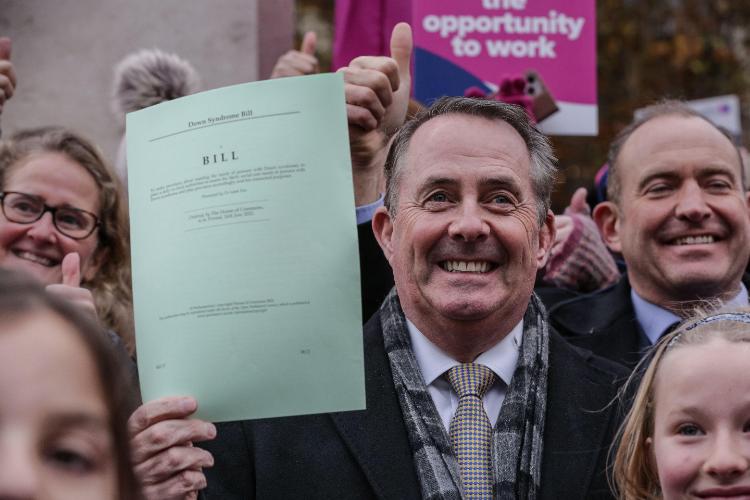How Liam Fox passed the world's first legislation for Down syndrome
Liam Fox with celebrates with the National Down Syndrome Policy Group (Credit: Imageplotter / Alamy Stock Photo)
7 min read
Liam Fox passed the world’s first legislation for Down syndrome through his Private Member’s Bill. He speaks to Sophie Church about the joys of passing a bill that he says will support people with Down syndrome for years to come
“We had Matt Hancock…keen to do a workout in this room as part of a Down syndrome fitness programme. We certainly put [him] through his paces!”
Conservative MP for North Somerset Liam Fox is gesturing to a spot in his office where, about a year ago, former health secretary Matt Hancock had been on the patterned carpet performing sit ups. Leading his workout was 18 year-old Tom Fit, an aspiring fitness coach with Down syndrome.
“Matt said to me after he went on I’m A Celebrity, ‘I bet you thought that day in your room was the most you have ever seen me humiliated!’” laughs Fox. “He was really charming with the people with Down syndrome who were here. Full marks to him.”
The fitness duo were raising awareness for World Down Syndrome Day, an annual event which for Fox, has taken on special meaning. In April 2022, Fox made history – by using his Private Member’s Bill to push through the world’s first ever legislation for Down syndrome. The bill has drawn international attention, with several American states interested in replicating it domestically.
The boy next door to me had Down syndrome, so it was something from when I was a toddler that I was very familiar with, and I only recently understood the problems as I got older
Fox, now 61, first came across Down syndrome as a boy growing up in East Kilbride. “The boy next door to me had Down syndrome, so it was something from when I was a toddler that I was very familiar with, and I only recently understood the problems as I got older,” he says.
When Fox become an MP, his constituent Annabel Tall – now his constituency assistant – visited him at his surgery asking for his help in getting proper care for her boy with Down syndrome. “We fought hard for that,” says Fox.
It was this tough battle that inspired Fox to dedicate his Private Member’s Bill to improving the lives of people with Down syndrome. “When I won the Private Members’ [Bill] ballot, we came to the view: why don’t we give other parents and other MPs the tools to fight that we found so difficult to achieve?”
People with Down syndrome have a unique combination of challenges – some complex and singular, others associated with learning – that Fox came across when a practising GP. In promoting the bill, he was determined to cater for these unique characteristics especially. “I am very keen to ensure that we don’t have a pan-disability bill,” he says, “and that we understand that Down syndrome is exactly that – it is a syndrome with very identifiable elements, and that we don’t try to dilute it too much.”
 Liam Fox celebrates with National Down Syndrome Policy Group activists (Credit: Imageplotter / Alamy Stock Photo)
Liam Fox celebrates with National Down Syndrome Policy Group activists (Credit: Imageplotter / Alamy Stock Photo)
Fox speaks proudly about the reaction of MPs in the House. “If you read those debates, it was tremendous that MPs were getting up one after another, talking about their own experiences, problems and struggles with and on behalf of people with Down syndrome,” he says. “I think because MPs are, in general, extremely conscientious, and very dedicated to the welfare of the people that they are elected to represent, they understood that this was a real opportunity for change.”
The bill also came to the attention of MPs, however, for the way in which it was passed. Fox has once again made history for passing two consecutive Private Member’s Bills in successive sessions – the first time this has ever happened in Parliament. “Meg Hillier said to me at one point: ‘you should set up a course for how to get a Private Members’ Bill through Parliament!’”
But winning the ballot two years in a row was just “a little bit of luck,” he says. “One of the Labour MPs in Parliament was complaining on Friday that she had waited 11 years to get a Private Member’s Bill. As I pointed out to her, she was a total beginner because it took me 29 to get my first and 30 to get my second!”
While Fox seems bemused at his “little bit of luck”, he speaks earnestly about the power politicians can wield when they mobilise behind a cause. “It is a great antidote to the cynicism that we seem to experience today, particularly in our media, that you are able to do those things,” he says. “With all the stuff that we have gone through with Brexit and the pandemic, and all the disruptions that we have had, and the tensions between parties in Parliament and the tensions between Parliament and the public at times, it was just nice to be part of a project that went so well.”
Fox’s North Somerset constituents were equally supportive. He tells how the bill received “tremendous coverage” by the work of a local reporter at the North Somerset Times who had a family connection with Down syndrome. “People like when their MP is pursuing something that is non-political and where they can see the direct benefit of it,” he says.
The fact life expectancy has increased so much for people with Down syndrome is good news, but also presents a new and evolving challenge. “This will be the first generation of people with Down syndrome who will outlive their parents,” he says. “When I was growing up…life expectancy at that time was about 13. By the time I was a junior doctor it was over 30. Now it is nearly 60.” Fox says advances in medical science – particularly in paediatric surgery – have helped improve life expectancy.
 Liam Fox holds bill (Credit: Imageplotter / Alamy Stock Photo)
Liam Fox holds bill (Credit: Imageplotter / Alamy Stock Photo)
“One of the biggest concerns has been: what provision will local government make to enable independent living when parents are no longer there?” Fox says.
Some critics argued that the bill discriminated against people who have other forms of learning difficulties. “Our key concern is that the Act singles out one rare genetic condition,” says Genetic Alliance UK, which has challenged the bill on behalf of organisations that represent conditions presenting in similar ways to Down syndrome. “This may lead to a hierarchy of access to already scarcely available services, and undermine the allocation of services on a needs basis.”
Rosa Monckton, whose daughter has Down syndrome, campaigns on behalf of people with learning disabilities. “People with learning disabilities are basically the most marginalised group in the country; they don’t have a voice,” she says. “There is a wide area of people with all sorts of severe learning disabilities, and particularly those who don’t have an official diagnosis, they completely fall through the gaps.”
Genetic Alliance UK sent a letter to Fox and those who spoke in favour of the bill in the House of Commons outlining its concerns. In response, Fox says that “the [former care and mental health] minister made clear in committee that, in drawing up the guidance, conditions with similar symptoms would be taken into consideration”.
The House leaves Fox to muddle through a diary clash: where he is potentially speaking at a World Down Syndrome Day debate at the United Nations New York headquarters, but is also due to host an afternoon tea reception in celebration of World Down Syndrome Day in the House of Commons with the National Down Syndrome Policy Group, who have been a key organisation working with him on the Down Syndrome Act, on the same day.
“I can’t be in two places at the same time on opposite sides of the Atlantic,” he says, “but these are quite nice problems to have to face!”
